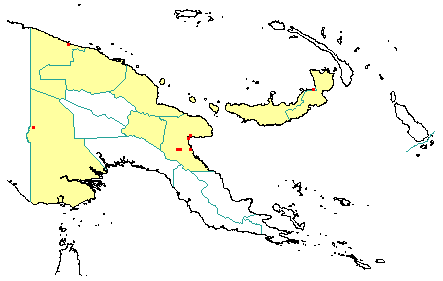
in PNGplants database
PNGTreesKey – Neonauclea obversifolia (Valeton) Merr. & L.M.Perry |
Barry Conn (NSW) & Kipiro Damas (LAE).
Guide to trees of Papua New Guinea
Copyright held by the authors, National Herbarium of New South Wales, and Papua New Guinea National Herbarium
Journal of the Arnold Arboretum Vol. 25: 188 (1944)
Other Literature: C.E. Ridsdale, Blumea 242 (1989) Fig. 28 (map).
Family: Rubiaceae
Dicotyledon
Timber Group: Commercial hardwood
Field Characters: Large canopy tree (up to 46 m high); Bole cylindrical (up to c. 50 cm diam.); straight (bole up to c. 20 m long); buttresses buttresses present (buttresses up to 2 m high) or usually buttresses absent; spines spines absent; aerial roots aerial roots absent; stilt roots stilt roots absent; Bark brown or grey, slightly rough, sometimes pustular or scaly or flaky, slightly lenticels irregular; Subrhytidome (under-bark) brown (pale (silvery brown) or white; less than 25 mm thick, 20.0-25.0; bark blaze consisting of one layer; faintly to non-aromatic; outer blaze white, yellow (pale (straw-coloured), or pale brown, markings absent; inner blaze white, yellow (pale (straw-coloured), or pale brown, markings absent; bark exudate (sap) absent; terminal buds enclosed by leaves.
Indumentum: Complex hairs absent; stinging hairs absent; mature twig indumentum (hairs) absent.
Leaves: Leaves spaced along branches, opposite (in pairs, opposite one another on the branchlet), simple (a leaf composed of a single blade); petiole present, not winged, attached to base of leaf blade, not swollen; leaves broadest at or near middle, 7.0-11.0 (-16.0) cm, 3.0-6.0 cm; symmetric, entire, not dissected or lobed, acuminate or obtuse, venation pinnate, secondary veins open, not prominent, but visible, intramarginal veins absent; leaves lower surface pale green, upper surface dark green, indumentum (hairs) absent; absent; domatia absent; stipules present, joined, joined across twigs, not encircling the twig, leafy, fringed (finely hairy), large (6-10 mm long), not persistent.
Flowers: Inflorescence terminal, flowers arising from a single point (Flowering globular clusters occurring singly or in threes), cones absent; flowers bisexual, stalked (shortly (subsessile) or not stalked, flowers with many planes of symmetry, 6.0-9.0 mm long, diameter small (up to10 mm diam.) (4-5 mm diam.); perianth present, with distinct sepals and petals whorls, inner perianth cream-coloured or white; 5, some or partly joined; stamens 5, present (short), free of each other, joined to the perianth; ovary inferior, carpels joined (when more than one), locules 2; styles solitary, 1.
Fruits: Infrutescence arising from single point (forming a globular fruiting head 12-15 mm diam.), fruit 3.0-5.0 mm long, 2.0 (c.) mm diam., pale brown, not spiny, non-fleshy, multiple, dehiscent (each fruitlet), capsule (each fruitlet splitting into 4 values); seeds 1 (per fruitlet; many per globular fruiting head), to about 5 mm long, winged (at both ends), narrow (longer than wide) (somewhat bilaterally flattened), seed 1-10 mm diam. (c. 2 mm diam.).
Distribution: West Sepik, East Sepik, Madang, Morobe, Eastern Highlands, Western & New Britain.
 | Botanical records in PNGplants database |